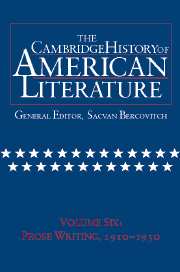Book contents
- Frontmatter
- Introduction
- A Cultural History of the Modern American Novel: Introduction
- 1 A Dream City, Lyric Years, and a Great War
- 1 The Novel as Ironic Reflection
- 2 Confidence and Uncertainty in The Portrait of A Lady
- 3 Lines of Expansion
- 4 Four Contemporaries and the Closing of the West
- 5 Chicago’s “Dream City”
- 6 Frederick Jackson Turner in The Dream City
- 7 Henry Adams’s Education and The Grammar of Progress
- 8 Jack London’s Career and Popular Discourse
- 9 Innocence and Revolt in the “Lyric Years”: 1900–1916
- 10 The Armory show of 1913 and the Decline of Innocence
- 11 The Play of Hope and Despair
- 12 The Great War and The Fate of Writing
- 2 Fiction in a Tme of Plenty
- 3 The Fate of Writing During the Great Depression
- Fictions of the Harlem Renaissance
- Ethnic Modernism
- Chronology
- Bibliography
- Index
7 - Henry Adams’s Education and The Grammar of Progress
from 1 - A Dream City, Lyric Years, and a Great War
Published online by Cambridge University Press: 28 March 2008
- Frontmatter
- Introduction
- A Cultural History of the Modern American Novel: Introduction
- 1 A Dream City, Lyric Years, and a Great War
- 1 The Novel as Ironic Reflection
- 2 Confidence and Uncertainty in The Portrait of A Lady
- 3 Lines of Expansion
- 4 Four Contemporaries and the Closing of the West
- 5 Chicago’s “Dream City”
- 6 Frederick Jackson Turner in The Dream City
- 7 Henry Adams’s Education and The Grammar of Progress
- 8 Jack London’s Career and Popular Discourse
- 9 Innocence and Revolt in the “Lyric Years”: 1900–1916
- 10 The Armory show of 1913 and the Decline of Innocence
- 11 The Play of Hope and Despair
- 12 The Great War and The Fate of Writing
- 2 Fiction in a Tme of Plenty
- 3 The Fate of Writing During the Great Depression
- Fictions of the Harlem Renaissance
- Ethnic Modernism
- Chronology
- Bibliography
- Index
Summary
Adams might well have conceded Turner special authority, for he thought of people like Turner as allied with the future. He may even have felt some sympathy for Turner’s purpose: few episodes in the search for some “form of religious hope” or “promise of ultimate perfection” left him wholly unmoved. Still, in his own reflections he remained ambivalent about the consolidated forces that were shaping the modern world and skeptical about the several theories – “formulas,” “arranged sequences,” and “convenient fictions,” he called them at various times – that proposed to explain them. In a chapter of The Education called “The Grammar of Science” (the title of a book by Karl Pearson published in 1899), he follows Pearson in contrasting the precision of our knowledge of the world made available through sensory experience to science with the uncertainty of our knowledge of all relations between our deepest human needs and the world we inhabit:
Pearson shut out of science everything which the nineteenth century had brought into it. He told his scholars that they must put up with a fraction of the universe, and a very small fraction at that – the circle reached by the senses, where sequence could be taken for granted.…“Order and reason, beauty and benevolence, are characteristics and conceptions which we find solely associated with the mind of man.”
In his sense of the allure and the threat of dissociation between nature and culture, in which nature becomes an object of analysis, manipulation, and exploitation, while culture becomes the creation of human hands directed by “characteristics and conceptions...solely associated with the mind of man,” Adams locates the origin of the “modern” mind – including “American” versions of it.
- Type
- Chapter
- Information
- The Cambridge History of American Literature , pp. 48 - 56Publisher: Cambridge University PressPrint publication year: 2002

